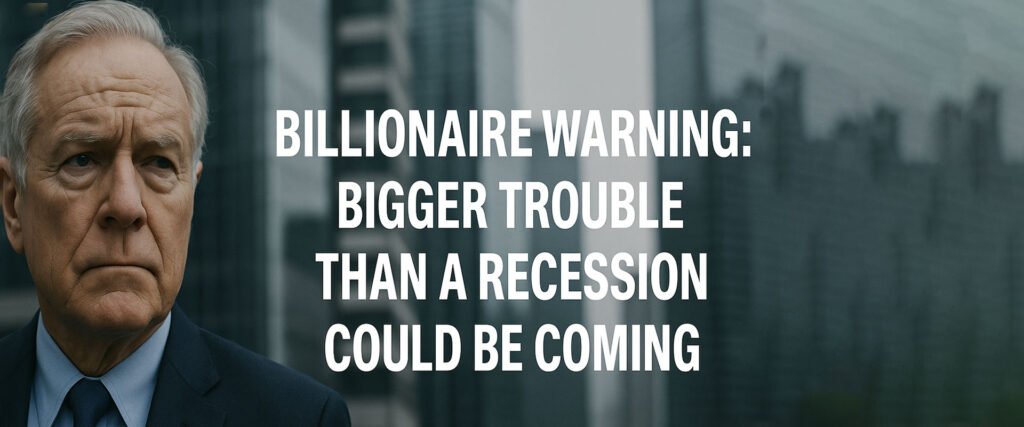Billionaire Warning: Bigger Trouble Than a Recession Could Be Coming
- Home
- Blogs
- Billionaire Warning: Bigger Trouble Than a Recession Could Be Coming

- Published By TechPik.in
- Date: April 20, 2025
- Reading Time: 4-5 minutes
In a startling financial forecast, a prominent billionaire investor has issued a dire warning that the world may soon face an economic threat far greater than a traditional recession. This stark message comes at a time when global markets are already on edge, dealing with rising inflation, geopolitical instability, and sluggish growth.
According to recent interviews and insights, the unnamed billionaire—closely followed in financial circles—believes that structural flaws in global markets could trigger a larger systemic collapse if not addressed urgently.
What Did the Billionaire Say?
While many experts have predicted a slowdown or mild recession in 2025, this billionaire investor went a step further:
> “This isn’t just about a recession or a correction. We’re looking at a potential financial reset — a correction of broken systems that have been artificially propped up for too long.”
The core of his concern lies in:
- Over-leveraged debt markets
- Excessive government borrowing with no long-term repayment plan
- Weakening faith in fiat currencies
- Asset bubbles in real estate and tech
- Central bank over-dependence
- These aren’t typical indicators of a cyclical recession — they point to deep cracks in the global economic architecture.
Why Should You Be Concerned?
Economic cycles are natural. However, when multiple economic bubbles exist at once, the bursting of one can rapidly lead to domino effects across industries and countries.
The warning implies:
- Asset bubbles could burst, particularly in stocks, crypto, and high-value tech.
- Interest rate hikes might trigger widespread loan defaults.
- Government stimulus support could dry up, leaving vulnerable sectors exposed.
- Investor confidence may crumble, leading to panic selling.
For the everyday investor or business owner, this could mean:
- Shrinking wealth
- Job losses
- Stalled business growth
- And limited access to credit
How Does This Compare to Past Crises?
Financial historians are already comparing this warning to the 2008 global financial crisis — or even the Great Depression of the 1930s. The difference? Today’s world is hyper-connected, and a collapse in one part of the system could spread much faster globally due to digital and financial interlinkages.
In the billionaire’s own words:
> “The interconnected nature of modern finance makes this unlike any crisis before. If we don’t act with urgency, the world may not be prepared for what’s coming.”
Is There Any Silver Lining?
Yes, some economists argue that better risk controls and greater data access make today’s global markets more resilient. They point to:
- Diversified economies
- Tighter banking regulations post-2008
- Digital financial innovations (such as blockchain and DeFi) as potential buffers
However, even these experts admit that governments and institutions must take pre-emptive steps to safeguard against a deep financial shock.
What Can Individuals Do?
If the billionaire’s warning proves true, early preparation could help mitigate damage:
- 1. Diversify your investments: Don’t place all your assets in one class.
- 2. Reduce personal debt: Especially high-interest debt like credit cards or personal loans.
- 3. Build emergency savings: Have at least 6 months of expenses in a liquid form.
- 4. Stay informed: Keep track of economic signals from trusted financial analysts.
- 5. Invest in knowledge: Upskill or reskill for industries that stay resilient during downturns.
Final Thoughts
This isn’t about spreading panic — it’s about staying informed and prepared. Billionaires often have access to exclusive economic data, geopolitical insights, and predictive models that the average investor doesn’t. Their warnings may not always come true — but when they do, history remembers them as cautionary signals we should have heeded.
Stay updated with TechPik for more breaking insights into global finance, economy, and the evolving future of money.
Share Us On:

